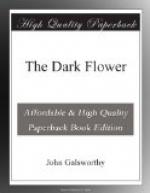“Would you mind if I showed you my drawings? It would be awfully good of you. You could tell me about them.” And with dismay he saw her open a portfolio. While he scrutinized those schoolgirl drawings, he could feel her looking at him, as animals do when they are making up their minds whether or no to like you; then she came and stood so close that her arm pressed his. He redoubled his efforts to find something good about the drawings. But in truth there was nothing good. And if, in other matters, he could lie well enough to save people’s feelings, where Art was concerned he never could; so he merely said:
“You haven’t been taught, you see.”
“Will you teach me?”
But before he could answer, she was already effacing that naive question in her most grown-up manner.
“Of course I oughtn’t to ask. It would bore you awfully.”
After that he vaguely remembered Dromore’s asking if he ever rode in the Row; and those eyes of hers following him about; and her hand giving his another childish squeeze. Then he was on his way again down the dimly-lighted stairs, past an interminable array of Vanity Fair cartoons, out into the east wind.
III
Crossing the Green Park on his way home, was he more, or less, restless? Difficult to say. A little flattered, certainly, a little warmed; yet irritated, as always when he came into contact with people to whom the world of Art was such an amusing unreality. The notion of trying to show that child how to draw—that feather-pate, with her riding and her kitten; and her ‘Perdita’ eyes! Quaint, how she had at once made friends with him! He was a little different, perhaps, from what she was accustomed to. And how daintily she spoke! A strange, attractive, almost lovely child! Certainly not more than seventeen—and—Johnny Dromore’s daughter!
The wind was bitter, the lamps bright among the naked trees. Beautiful always—London at night, even in January, even in an east wind, with a beauty he never tired of. Its great, dark, chiselled shapes, its gleaming lights, like droves of flying stars come to earth; and all warmed by the beat and stir of innumerable lives— those lives that he ached so to know and to be part of.
He told Sylvia of his encounter. Dromore! The name struck her. She had an old Irish song, ‘The Castle of Dromore,’ with a queer, haunting refrain.
It froze hard all the week, and he began a life-size group of their two sheep-dogs. Then a thaw set in with that first south-west wind, which brings each February a feeling of Spring such as is never again recaptured, and men’s senses, like sleepy bees in the sun, go roving. It awakened in him more violently than ever the thirst to be living, knowing, loving—the craving for something new. Not this, of course, took him back to Dromore’s rooms; oh, no! just friendliness, since he had not even told his old room-mate where he lived, or said that his wife would be glad to make his acquaintance, if he cared to come round. For Johnny Dromore had assuredly not seemed too happy, under all his hard-bitten air. Yes! it was but friendly to go again.




